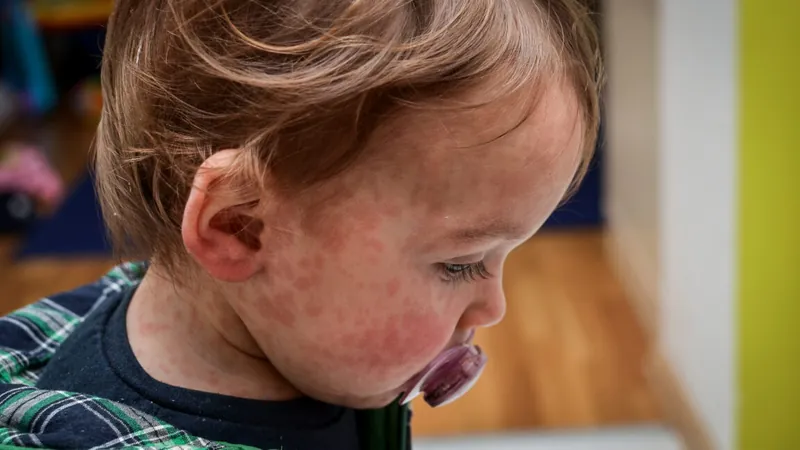
Tragic Measles Complication Claims Young Life in Los Angeles
2025-09-11
Author: Ting
In a heartbreaking turn of events, a child in Los Angeles has succumbed to a devastating brain disorder linked to a past measles infection. The Los Angeles County health department confirmed the tragic news, revealing the child suffered from subacute sclerosing panencephalitis (SSPE), a rare yet fatal complication that can surface years after the initial measles infection.
The health department has not disclosed the child's age but confirmed that they contracted measles before being eligible for vaccination, which begins at 12 months. Health Officer Muntu Davis emphasized the significance of community immunity: "This case is a painful reminder of how dangerous measles can be, especially for our most vulnerable community members. Vaccination is not just about protecting yourself; it’s about protecting those who are too young to be vaccinated."
The Grim Reality of SSPE
SSPE is caused by a lingering measles virus in the central nervous system, affecting approximately 1 in 10,000 individuals infected with measles. For those who contract the virus as infants, the risk skyrocket to about 1 in 600. Symptoms typically commence between 7 to 10 years post-infection, following an initial recovery period from the measles.
Recent data highlights alarming trends: with vaccination rates declining amidst anti-vaccine rhetoric, the U.S. has witnessed a surge in measles cases, marking a 33-year high. Sadly, this includes the loss of two other children and an adult to measles complications this year alone.
The Horrific Stages of SSPE
The progression of SSPE is harrowing. It starts with mood changes and depression, escalating to uncontrolled movements, vision loss, and dementia. Eventually, it can severely impair vital brain functions, leading to coma and death. A tragic case from 2016 illustrates this: a boy who contracted measles as a baby in the Philippines began to show symptoms at age 11, drastically transforming from a vibrant student to a child unable to recognize his family.
With symptoms advancing relentlessly, his speech, movement, and appetite deteriorated. Ultimately, after declining into unresponsiveness over several months, he required hospice care, passing away nearly four years later.
This devastating narrative highlights the critical need for consistent vaccination adherence to ensure the safety of younger, vulnerable populations. With SSPE treatments nonexistent, the focus remains on disease prevention through immunization.
The heart-wrenching experiences shared in such cases reinforce the urgent call for maintaining high vaccination rates to protect not just individual health but entire communities. Muntu Davis’s message rings louder than ever: Vaccination isn’t just personal—it's a communal responsibility.

 Brasil (PT)
Brasil (PT)
 Canada (EN)
Canada (EN)
 Chile (ES)
Chile (ES)
 Česko (CS)
Česko (CS)
 대한민국 (KO)
대한민국 (KO)
 España (ES)
España (ES)
 France (FR)
France (FR)
 Hong Kong (EN)
Hong Kong (EN)
 Italia (IT)
Italia (IT)
 日本 (JA)
日本 (JA)
 Magyarország (HU)
Magyarország (HU)
 Norge (NO)
Norge (NO)
 Polska (PL)
Polska (PL)
 Schweiz (DE)
Schweiz (DE)
 Singapore (EN)
Singapore (EN)
 Sverige (SV)
Sverige (SV)
 Suomi (FI)
Suomi (FI)
 Türkiye (TR)
Türkiye (TR)
 الإمارات العربية المتحدة (AR)
الإمارات العربية المتحدة (AR)